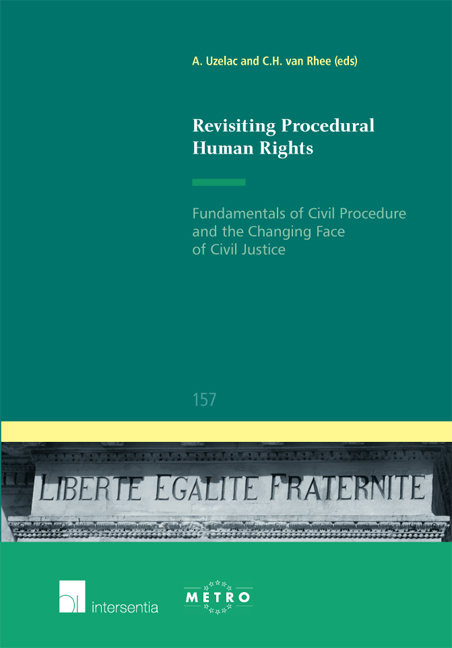 Revisiting Procedural Human Rights
Revisiting Procedural Human Rights Book contents
- Frontmatter
- Table of Contents
- List of Authors
- List of Abbreviations
- Acknowledgements
- Introduction
- The Human Right to Accessible and Foreseeable Justice
- Fundamental Procedural Rights from a National Angle
- Doing Justice: Chinese Civil Procedure and its Reform
- The Presumption of Innocence in Civil Cases
- Fighting Recession at the Expense of Access to Justice. The Case of the Croatian Financial Operations and Pre-Bankruptcy Settlement Act
- The Right Principles – What Outcome? Fundamental Procedural Rights and their Implementation in Romanian Civil Procedure and Other Legal Systems
- What is Happening to Fundamental Procedural Guarantees in the Area of Civil Justice? A View from South Africa
- Judicial Reform in Russia and its Impact on Procedural Human Rights and Access to Justice
- Conditions of Admissibility and Access to Justice – A Slovenian Perspective
- Wheels of History: Fair Trial Rights in Historical Perspective
- Equal Justice for all: Empirical and Normative Approaches to Legal Aid and Assistance in Civil and Administrative Cases
- Ius Commune Europaeum
The Presumption of Innocence in Civil Cases
from Fundamental Procedural Rights from a National Angle
Published online by Cambridge University Press: 13 October 2018
- Frontmatter
- Table of Contents
- List of Authors
- List of Abbreviations
- Acknowledgements
- Introduction
- The Human Right to Accessible and Foreseeable Justice
- Fundamental Procedural Rights from a National Angle
- Doing Justice: Chinese Civil Procedure and its Reform
- The Presumption of Innocence in Civil Cases
- Fighting Recession at the Expense of Access to Justice. The Case of the Croatian Financial Operations and Pre-Bankruptcy Settlement Act
- The Right Principles – What Outcome? Fundamental Procedural Rights and their Implementation in Romanian Civil Procedure and Other Legal Systems
- What is Happening to Fundamental Procedural Guarantees in the Area of Civil Justice? A View from South Africa
- Judicial Reform in Russia and its Impact on Procedural Human Rights and Access to Justice
- Conditions of Admissibility and Access to Justice – A Slovenian Perspective
- Wheels of History: Fair Trial Rights in Historical Perspective
- Equal Justice for all: Empirical and Normative Approaches to Legal Aid and Assistance in Civil and Administrative Cases
- Ius Commune Europaeum
Summary
Introduction
The presumption of innocence is a characteristic element of modern European law. The presumption has a remarkably long history and it is recognised in Anglo- American jurisdictions, Germanic jurisdictions, Latin jurisdictions and Scandinavian jurisdictions. In several European countries, the presumption of innocence has the privilege of being part of the constitution. It is also included in several international conventions on human rights, for instance the International Covenant on Civil and Political Rights, Article 14(2), the European Convention on Human Rights (ECHR), Article 6(2) and the Charter of Fundamental Rights of the European Union, Article 48(1).
Even though the presumption of innocence primarily concerns criminal cases, and the scope of Article 6(2) ECHR is limited to criminal offences, the European Court of Human Rights (the Court) has applied several aspects of Article 6(2) in civil cases under domestic law. Firstly, the paragraph entails a prohibition against a state official making a statement implying that a person is guilty of a criminal act before he has been convicted in a final verdict. This aspect of Article 6(2) is applicable in civil cases, for instance when a court orders a person to pay compensation because of an action of which he has previously been acquitted in a criminal case. Acquittal in the criminal case does not preclude civil liability, but the presumption of innocence might be infringed if the civil judgment includes a statement imputing criminal liability. Secondly, the paragraph contains a requirement concerning the burden of proof and the standard of evidence. This aspect of Article 6(2) is applicable in a civil case if the case involves a ‘criminal offence’ under the Convention even though it is not a criminal case in the domestic system, a combination made possible by the autonomous concept of criminal offence developed by the Court. Cases that are civil under domestic law and criminal under ECHR typically concern administrative sanctions, which are sanctions imposed by a public body on an individual or a company because of an illegal act carried out by that individual or company. Such sanctions are usually a fine, revocation of a licence or some other economic sanction.
The subject of this contribution is the requirements Article 6(2) sets for the burden of proof and the standard of evidence in cases that are civil under domestic law.
- Type
- Chapter
- Information
- Revisiting Procedural Human RightsFundamentals of Civil Procedure and the Changing Face of Civil Justice, pp. 115 - 134Publisher: IntersentiaPrint publication year: 2017
- 2
- Cited by
